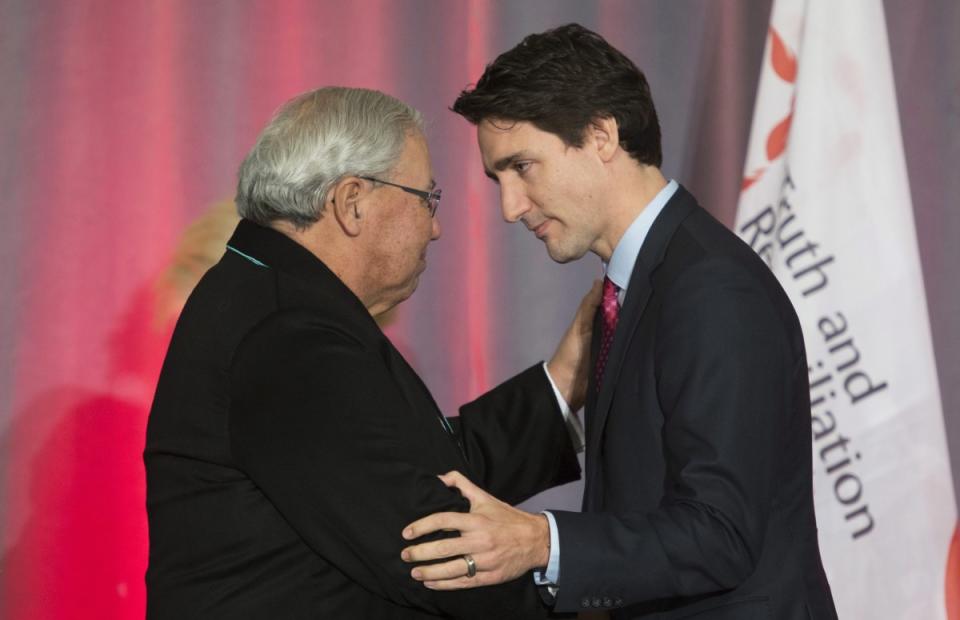Miles Morrisseau
ICT
Revered Anishinaabe leader Murray Sinclair — a member of the Peguis First Nation and a former senator, judge and chair of Canada’s Truth and Reconciliation Commission — died Monday, Nov. 4, at a Winnipeg hospital. He was 73.
His family released a statement saying he had died “peacefully and surrounded by love.”
“Maziina Giizhik (the one who speaks of pictures in the sky) committed his life in service to the people: creating change, revealing truth, and leading with fairness throughout his career. The impact of our dad’s work reached far across the country and the world,” read the statement.
The family is asking that in lieu of flowers donations can be made to the Murray Sinclair Memorial Fund at The Winnipeg Foundation. A sacred fire will be held on the grounds of the Manitoba Legislature.
“Everyone is welcome to visit his sacred fire to make an offering of tobacco and send him your best wishes,” the family said. “Out of respect for his journey for the next few days the family respectfully asks others across the country to please, do not light any other fires for him. Additional information about public ceremony events will be available in the coming days. Our family asked for privacy in this time of mourning.”
” src=”https://s.yimg.com/ny/api/res/1.2/YDPCWfJxhUCxYr4zpMFkWg–/YXBwaWQ9aGlnaGxhbmRlcjt3PTk2MDtoPTYyMA–/https://media.zenfs.com/en/indian_country_today_articles_355/ae1208233c1c5444731618a098fde696″ class=”caas-img”>
Justice Murray Sinclair, left, chair of Canada’s Truth and Reconciliation Commission, shakes hands with Canadian Prime Minister Justin Trudeau during the release of the commission’s final report in Ottawa, Canada, on Dec. 15, 2015. (Adrian Wyld/The Canadian Press via AP)
Canadian Prime Minister Justin Trudeau released a statement calling Sinclair a “giant and champion.”
“He listened to residential school survivors, and he made sure Canada heard their stories,” Trudeau said in a statement posted to X, formerly known as Twitter. “He advocated for the right of Indigenous students to go to school in their language and culture. And he was kind, patient, and understanding to people like me, who had a lot to learn. ‘Education got us into this mess,’ he said. ‘Education will get us out.”
“With his passing, Canada has lost a giant — a brilliant legal mind, a champion of Indigenous rights, and a trusted leader on our journey of Reconciliation. My thoughts are with the Sinclair family, his friends, his colleagues, and everyone who is grieving today. We will miss him dearly,” Trudeau said.
The Honourable Murray Sinclair dedicated his life to repairing Canada’s relationship with Indigenous Peoples. As the Chief Commissioner of the Truth and Reconciliation Commission, he challenged us to confront the darkest parts of our history — because he believed we could learn… pic.twitter.com/6MblQg9fTg
— Justin Trudeau (@JustinTrudeau) November 4, 2024
‘Who We Are’
Sinclair was born on Jan. 24, 1951, in the town of Selkirk about 20 miles east of Winnipeg. He attended both the University of Winnipeg and The University of Manitoba, graduating from the University of Manitoba’s Faculty of Law in 1979. In 1980, he was called to the bar.
In 1988, Sinclair became the first Indigenous person to be appointed judge in the province of Manitoba and only the second in the entire country. He gained national recognition soon after when was appointed as co-chair of Manitoba’s Aboriginal Justice Inquiry. The inquiry was in response to two killings in the province, the brutal murder of Cree teenager Helen Betty Osbourne in the northern town of The Pas and the police killing of J.J. Harper on the streets of Winnipeg.
In 2007, Sinclair took on a role of historic proportion when he accepted the role of chair of Canada’s Truth and Reconciliation Commission, which would look into the history and legacy of the Canada’s Indian Residential School System.

Over an eight-year mandate, Sinclair and the commission heard devastating stories of loss and abuse from thousands of survivors of the schools. The commission also unearthed records of medical studies and reports of thousands of unmarked graves and undocumented deaths.
The commission’s final report included the 94 calls to action, and remains a foundational document on the road to reconciliation.
Sinclair was appointed to the Canadian Senate in 2016, a position he held for five years before retiring, despite the fact that it was a lifetime appointment. He said he wanted to continue the work at the community level in law and reconciliation.
Sinclair received numerous awards and acknowledgements, including more than a dozen honorary degrees as well the Order of Manitoba and the Order of Canada.
His memoir, “Who We Are: Four Questions for a Life and a Nation,” was recently published and shares the questions he asked of his own life and the questions he asked of his country.
‘A kind, wise and generous soul’
Canada mourned the loss of the iconic leader.
Governor General Mary Simon, the King of England’s representative to Canada, released a statement of condolence.
“He leaves behind an invaluable legacy of bringing to light the stories of thousands of Residential Schools Survivors,” Simon, Inuk, who is the first Indigenous person who served as Governor General.
“This marking moment in Canada’s history led to the Truth and Reconciliation Commission’s 94 calls to action, which have initiated positive change for Indigenous communities in all spheres of society,” Simon said. “In 2022, I had the privilege to invest Senator Sinclair as Companion of the Order of Canada for his life’s work. A kind, wise and generous soul, he had an exceptional ability to inspire people and to touch hearts. On behalf of all Canadians, Whit and I offer our deepest condolences to the Sinclair family, who grieve the loss of a father and grandfather.”
Simon continued, “As a nation, let us honour his memory and sacrifice by forging ahead on the path of reconciliation.”
Assembly of First Nations National Chief Cindy Woodhouse Nepinak, Pinaymootang First Nation and a former Manitoba regional chief, said Sinclair’s legacy will live on.
“First Nations from coast to coast to coast are in mourning,” Woodhouse Nepinak said. “We are all devastated by the loss of Justice Sinclair. He was not only a tremendous advocate for the rights of First Nations and all Indigenous Peoples, but also a transformational force in the pursuit of reconciliation. It was Justice Sinclair’s leadership that has brought us this far along in the reconciliation journey, and his example will continue to inspire this work for generations to come.”
Acting Grand Chief Betsy Kennedy of the Assembly of Manitoba Chiefs agreed.
“Today, we mourn the loss of a hero whose vision and leadership continue to guide us forward,” said Kennedy, of War Lake First Nation. “The Honourable Murray Sinclair’s tireless commitment to justice and truth has left a permanent mark on our nations and communities, and we carry his light as we strive for the betterment of our Nations.”
Manitoba Provincial Premier Wab Kinew called Sinclair “a great Canadian, a great Manitoban, a great Anishinaabe.”
“His career stands as a legacy of public service and a deep commitment to truth, fairness and dignity for all people,” Kinew, the nation’s first First Nations provincial premier, said in a statement.
“It will be a long time before our nation produces another person the calibre of Murray Sinclair,” Kinew said. “He showed us there is no reconciliation without truth. We should hold dear in our hearts his words that our nation is on the cusp of a great new era and we must all ‘dare to live greatly together’.”

Our stories are worth telling. Our stories are worth sharing. Our stories are worth your support. Contribute today to help ICT carry out its critical mission. Sign up for ICT’s free newsletter.
EMEA Tribune is not involved in this news article, it is taken from our partners and or from the News Agencies. Copyright and Credit go to the News Agencies, email news@emeatribune.com Follow our WhatsApp verified Channel




